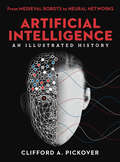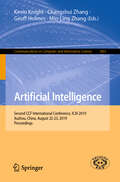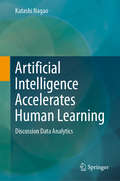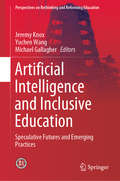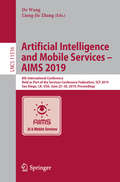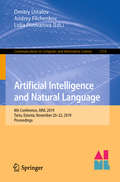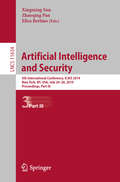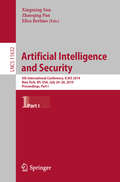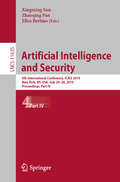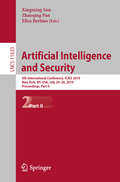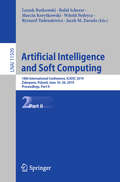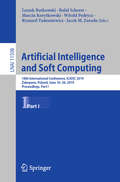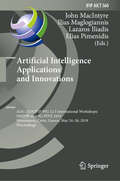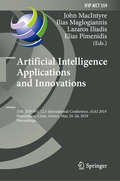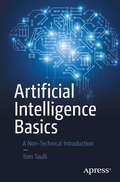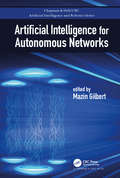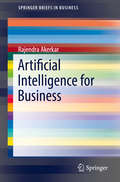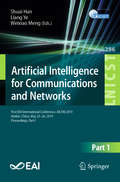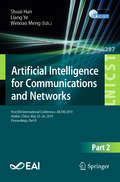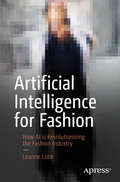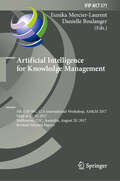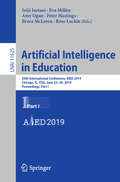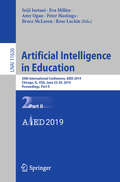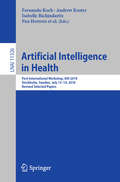- Table View
- List View
Artificial Intelligence: From Medieval Robots to Neural Networks (Union Square & Co. Illustrated Histories)
by Clifford A. Pickover“This is an addictive stroll through the annals of artificial intelligence, highlighting almost 100 innovations developed between 1300 BCE and 2018” (Booklist).From medieval robots and Boolean algebra to facial recognition, artificial neural networks, and adversarial patches, this fascinating history takes readers on a lively tour through the world of artificial intelligence. Award–winning author Clifford A. Pickover (The Math Book, The Physics Book, Death & the Afterlife) explores the historic and current applications of AI in such diverse fields as computing, medicine, popular culture, mythology, and philosophy, and considers the enduring threat to humanity should AI grow out of control. Across 100 illustrated entries, Pickover provides an entertaining and informative look into when artificial intelligence began, how it developed, where it’s going, and what it means for the future of human-machine interaction.“An enjoyable diversion to read cover to cover, follow along common strands, or dip into for random bits.” —Booklist
Artificial Intelligence: Second CCF International Conference, ICAI 2019, Xuzhou, China, August 22-23, 2019, Proceedings (Communications in Computer and Information Science #1001)
by Kevin Knight Changshui Zhang Geoff Holmes Min-Ling ZhangThis book constitutes the refereed proceedings of the Second CCF International Conference on Artificial Intelligence, CCF-ICAI 2019, held in Xuzhou, China in August, 2019. The 23 papers presented were carefully reviewed and selected from 97 submissions. The papers are organized in topical sections on deep learning, image and video processing, NLP and recommender system, machine learning algorithms, and AI applications.
Artificial Intelligence Accelerates Human Learning: Discussion Data Analytics
by Katashi NagaoFocusing on students’ presentations and discussions in laboratory seminars, this book presents case studies on evidence-based education using artificial intelligence (AI) technologies. It proposes a system to help users complete research activities, and a machine-learning method that makes the system suitable for long-term operation by performing data mining for discussions and automatically extracting essential tasks. By illustrating the complete process – proposal, implementation, and operation – of applying machine learning techniques to real-world situations, the book will inspire researchers and professionals to develop innovative new applications for education. The book is divided into six chapters, the first of which provides an overview of AI research and practice in education. In turn, Chapter 2 describes a mechanism for applying data analytics to student discussions and utilizing the results for knowledge creation activities such as research. Based on discussion data analytics, Chapter 3 describes a creative activity support system that effectively utilizes the analytical results of the discussion for subsequent activities. Chapter 4 discusses the incorporation of a gamification method to evaluate and improve discussion skills while maintaining the motivation to participate in the discussion. Chapters 5 and 6 describe an advanced learning environment for honing students’ discussion and presentation skills. Two important systems proposed here are a presentation training system using virtual reality technologies, and an interactive presentation/discussion training system using a humanoid robot. In the former, the virtual space is constructed by measuring the three-dimensional shape of the actual auditorium, presentations are performed in the same way as in the real world, and the AI as audience automatically evaluates the presentation and provides feedback. In the latter, a humanoid robot makes some remarks on and asks questions about students’ presentations, and the students practice responding to it.
Artificial Intelligence and Conservation (Artificial Intelligence for Social Good)
by Fei Fang Milind Tambe Bistra Dilkina Andrew J. PlumptreWith the increasing public interest in artificial intelligence (AI), there is also increasing interest in learning about the benefits that AI can deliver to society. This book focuses on research advances in AI that benefit the conservation of wildlife, forests, coral reefs, rivers, and other natural resources. It presents how the joint efforts of researchers in computer science, ecology, economics, and psychology help address the goals of the United Nations' 2030 Agenda for Sustainable Development. Written at a level accessible to conservation professionals and AI researchers, the book offers both an overview of the field and an in-depth view of how AI is being used to understand patterns in wildlife poaching and enhance patrol efforts in response, covering research advances, field tests and real-world deployments. The book also features efforts in other major conservation directions, including protecting natural resources, ecosystem monitoring, and bio-invasion management through the use of game theory, machine learning, and optimization.
Artificial Intelligence and Inclusive Education: Speculative Futures and Emerging Practices (Perspectives on Rethinking and Reforming Education)
by Jeremy Knox Yuchen Wang Michael GallagherThis book brings together the fields of artificial intelligence (often known as A.I.) and inclusive education in order to speculate on the future of teaching and learning in increasingly diverse social, cultural, emotional, and linguistic educational contexts. This book addresses a pressing need to understand how future educational practices can promote equity and equality, while at the same time adopting A.I. systems that are oriented towards automation, standardisation and efficiency. The contributions in this edited volume appeal to scholars and students with an interest in forming a critical understanding of the development of A.I. for education, as well as an interest in how the processes of inclusive education might be shaped by future technologies. Grounded in theoretical engagement, establishing key challenges for future practice, and outlining the latest research, this book offers a comprehensive overview of the complex issues arising from the convergence of A.I. technologies and the necessity of developing inclusive teaching and learning.To date, there has been little in the way of direct association between research and practice in these domains: A.I. has been a predominantly technical field of research and development, and while intelligent computer systems and ‘smart’ software are being increasingly applied in many areas of industry, economics, social life, and education itself, a specific engagement with the agenda of inclusion appears lacking. Although such technology offers exciting possibilities for education, including software that is designed to ‘personalise’ learning or adapt to learner behaviours, these developments are accompanied by growing concerns about the in-built biases involved in machine learning techniques driven by ‘big data’.
Artificial Intelligence and Mobile Services – AIMS 2019: 8th International Conference, Held as Part of the Services Conference Federation, SCF 2019, San Diego, CA, USA, June 25–30, 2019, Proceedings (Lecture Notes in Computer Science #11516)
by De Wang Liang-Jie ZhangThis book constitutes the proceedings of the 8th International Conference on Artificial Intelligence and Mobile Services, AIMS 2019, held as part of SCF 2019, in San Diego, CA, USA, in June 2019. The 12 full papers and one short paper presented were carefully reviewed and selected from 29 submissions. The papers cover different aspects of mobile services from business management to computing systems, algorithms and applications. They promote technological technological innovations in research and development of mobile services, including, but not limited to, wireless and sensor networks, mobile and wearable computing, mobile enterprise and eCommerce, ubiquitous collaborative and social services, machine-to-machine and Internet-of-things, clouds, cyber-physical integration, and big data analytics for mobility-enabled services.
Artificial Intelligence and Natural Language: 8th Conference, AINL 2019, Tartu, Estonia, November 20–22, 2019, Proceedings (Communications in Computer and Information Science #1119)
by Dmitry Ustalov Andrey Filchenkov Lidia PivovarovaThis book constitutes the refereed proceedings of the 8th Conference on Artificial Intelligence and Natural Language, AINL 2019, held in Tartu, Estonia, in November 2019. The 10 revised full papers and 2 short papers were carefully reviewed and selected from 34 submissions. The papers are organized according to the following topics: data acquisition and annotation; human-computer interaction; statistical natural language processing; neural language models.
Artificial Intelligence and Security: 5th International Conference, ICAIS 2019, New York, NY, USA, July 26–28, 2019, Proceedings, Part III (Lecture Notes in Computer Science #11634)
by Xingming Sun Zhaoqing Pan Elisa BertinoThe 4-volume set LNCS 11632 until LNCS 11635 constitutes the refereed proceedings of the 5th International Conference on Artificial Intelligence and Security, ICAIS 2019, which was held in New York, USA, in July 2019. The conference was formerly called “International Conference on Cloud Computing and Security” with the acronym ICCCS.The total of 230 full papers presented in this 4-volume proceedings was carefully reviewed and selected from 1529 submissions. The papers were organized in topical sections as follows: Part I: cloud computing; Part II: artificial intelligence; big data; and cloud computing and security; Part III: cloud computing and security; information hiding; IoT security; multimedia forensics; and encryption and cybersecurity; Part IV: encryption and cybersecurity.
Artificial Intelligence and Security: 5th International Conference, ICAIS 2019, New York, NY, USA, July 26-28, 2019, Proceedings, Part I (Lecture Notes in Computer Science #11632)
by Xingming Sun Zhaoqing Pan Elisa BertinoThe 4-volume set LNCS 11632 until LNCS 11635 constitutes the refereed proceedings of the 5th International Conference on Artificial Intelligence and Security, ICAIS 2019, which was held in New York, USA, in July 2019. The conference was formerly called “International Conference on Cloud Computing and Security” with the acronym ICCCS.The total of 230 full papers presented in this 4-volume proceedings was carefully reviewed and selected from 1529 submissions. The papers were organized in topical sections as follows: Part I: cloud computing; Part II: artificial intelligence; big data; and cloud computing and security; Part III: cloud computing and security; information hiding; IoT security; multimedia forensics; and encryption and cybersecurity; Part IV: encryption and cybersecurity.
Artificial Intelligence and Security: 5th International Conference, ICAIS 2019, New York, NY, USA, July 26–28, 2019, Proceedings, Part IV (Lecture Notes in Computer Science #11635)
by Xingming Sun Zhaoqing Pan Elisa BertinoThe 4-volume set LNCS 11632 until LNCS 11635 constitutes the refereed proceedings of the 5th International Conference on Artificial Intelligence and Security, ICAIS 2019, which was held in New York, USA, in July 2019. The conference was formerly called “International Conference on Cloud Computing and Security” with the acronym ICCCS.The total of 230 full papers presented in this 4-volume proceedings was carefully reviewed and selected from 1529 submissions. The papers were organized in topical sections as follows: Part I: cloud computing; Part II: artificial intelligence; big data; and cloud computing and security; Part III: cloud computing and security; information hiding; IoT security; multimedia forensics; and encryption and cybersecurity; Part IV: encryption and cybersecurity.
Artificial Intelligence and Security: 5th International Conference, ICAIS 2019, New York, NY, USA, July 26-28, 2019, Proceedings, Part II (Lecture Notes in Computer Science #11633)
by Elisa Bertino Xingming Sun Zhaoqing PanThe 4-volume set LNCS 11632 until LNCS 11635 constitutes the refereed proceedings of the 5th International Conference on Artificial Intelligence and Security, ICAIS 2019, which was held in New York, USA, in July 2019. The conference was formerly called “International Conference on Cloud Computing and Security” with the acronym ICCCS.The total of 230 full papers presented in this 4-volume proceedings was carefully reviewed and selected from 1529 submissions. The papers were organized in topical sections as follows: Part I: cloud computing; Part II: artificial intelligence; big data; and cloud computing and security; Part III: cloud computing and security; information hiding; IoT security; multimedia forensics; and encryption and cybersecurity; Part IV: encryption and cybersecurity.
Artificial Intelligence and Soft Computing: 18th International Conference, ICAISC 2019, Zakopane, Poland, June 16–20, 2019, Proceedings, Part II (Lecture Notes in Computer Science #11509)
by Leszek Rutkowski Rafał Scherer Marcin Korytkowski Witold Pedrycz Ryszard Tadeusiewicz Jacek M. ZuradaThe two-volume set LNCS 11508 and 11509 constitutes the refereed proceedings of of the 18th International Conference on Artificial Intelligence and Soft Computing, ICAISC 2019, held in Zakopane, Poland, in June 2019. The 122 revised full papers presented were carefully reviewed and selected from 333 submissions. The papers included in the first volume are organized in the following five parts: neural networks and their applications; fuzzy systems and their applications; evolutionary algorithms and their applications; pattern classification; artificial intelligence in modeling and simulation. The papers included in the second volume are organized in the following five parts: computer vision, image and speech analysis; bioinformatics, biometrics, and medical applications; data mining; various problems of artificial intelligence; agent systems, robotics and control.
Artificial Intelligence and Soft Computing: 18th International Conference, ICAISC 2019, Zakopane, Poland, June 16–20, 2019, Proceedings, Part I (Lecture Notes in Computer Science #11508)
by Leszek Rutkowski Rafał Scherer Marcin Korytkowski Witold Pedrycz Ryszard Tadeusiewicz Jacek M. ZuradaThe two-volume set LNCS 11508 and 11509 constitutes the refereed proceedings of of the 18th International Conference on Artificial Intelligence and Soft Computing, ICAISC 2019, held in Zakopane, Poland, in June 2019. The 122 revised full papers presented were carefully reviewed and selected from 333 submissions. The papers included in the first volume are organized in the following five parts: neural networks and their applications; fuzzy systems and their applications; evolutionary algorithms and their applications; pattern classification; artificial intelligence in modeling and simulation. The papers included in the second volume are organized in the following five parts: computer vision, image and speech analysis; bioinformatics, biometrics, and medical applications; data mining; various problems of artificial intelligence; agent systems, robotics and control.
Artificial Intelligence Applications and Innovations: AIAI 2019 IFIP WG 12.5 International Workshops: MHDW and 5G-PINE 2019, Hersonissos, Crete, Greece, May 24–26, 2019, Proceedings (IFIP Advances in Information and Communication Technology #560)
by John MacIntyre Ilias Maglogiannis Lazaros Iliadis Elias PimenidisThis book constitutes the refereed proceedings of two International Workshops held as parallel events of the 15th IFIP WG 12.5 International Conference on Artificial Intelligence Applications and Innovations, AIAI 2019, in Hersonissos, Crete, Greece, in May 2019: the 8th Mining Humanistic Data Workshop, MHDW 2019, and the 4th Workshop on 5G-Putting Intelligence to the Network Edge, 5G-PINE 2019.The 6 full papers and 4 short papers presented at MHDW 2019 were carefully reviewed and selected from 13 submissions; out of the 14 papers submitted to 5G-PINE 2019, 6 were accepted as full papers and 1 as short paper. The MHDW papers focus on the application of innovative as well as existing data matching, fusion and mining and knowledge discovery and management techniques (such as decision rules, decision trees, association rules, ontologies and alignments, clustering, filtering, learning, classifier systems, neural networks, support vector machines, preprocessing, post processing, feature selection, visualization techniques) to data derived from all areas of humanistic sciences, e.g., linguistic, historical, behavioral, psychological, artistic, musical, educational, social, and ubiquitous computing and bioinformatics. The papers presented at 5G-PINE focus on several innovative findings coming directly from modern European research in the area of modern 5G telecommunications infrastructures and related innovative services and cover a wide variety of technical and business aspects promoting options for growth and development.
Artificial Intelligence Applications and Innovations: 15th IFIP WG 12.5 International Conference, AIAI 2019, Hersonissos, Crete, Greece, May 24–26, 2019, Proceedings (IFIP Advances in Information and Communication Technology #559)
by John MacIntyre Ilias Maglogiannis Lazaros Iliadis Elias PimenidisThis book constitutes the refereed proceedings of the 15th IFIP WG 12.5 International Conference on Artificial Intelligence Applications and Innovations, AIAI 2019, held in Hersonissos, Crete, Greece, in May 2019.The 49 full papers and 6 short papers presented were carefully reviewed and selected from 101 submissions. They cover a broad range of topics such as deep learning ANN; genetic algorithms - optimization; constraints modeling; ANN training algorithms; social media intelligent modeling; text mining/machine translation; fuzzy modeling; biomedical and bioinformatics algorithms and systems; feature selection; emotion recognition; hybrid Intelligent models; classification - pattern recognition; intelligent security modeling; complex stochastic games; unsupervised machine learning; ANN in industry; intelligent clustering; convolutional and recurrent ANN; recommender systems; intelligent telecommunications modeling; and intelligent hybrid systems using Internet of Things. The papers are organized in the following topical sections:AI anomaly detection - active learning; autonomous vehicles - aerial vehicles; biomedical AI; classification - clustering; constraint programming - brain inspired modeling; deep learning - convolutional ANN; fuzzy modeling; learning automata - logic based reasoning; machine learning - natural language; multi agent - IoT; nature inspired flight and robot; control - machine vision; and recommendation systems.
Artificial Intelligence Basics: A Non-Technical Introduction
by Tom TaulliArtificial intelligence touches nearly every part of your day. While you may initially assume that technology such as smart speakers and digital assistants are the extent of it, AI has in fact rapidly become a general-purpose technology, reverberating across industries including transportation, healthcare, financial services, and many more. In our modern era, an understanding of AI and its possibilities for your organization is essential for growth and success.Artificial Intelligence Basics has arrived to equip you with a fundamental, timely grasp of AI and its impact. Author Tom Taulli provides an engaging, non-technical introduction to important concepts such as machine learning, deep learning, natural language processing (NLP), robotics, and more. In addition to guiding you through real-world case studies and practical implementation steps, Taulli uses his expertise to expand on the bigger questions that surround AI. These include societal trends, ethics, and future impact AI will have on world governments, company structures, and daily life. Google, Amazon, Facebook, and similar tech giants are far from the only organizations on which artificial intelligence has had—and will continue to have—an incredibly significant result. AI is the present and the future of your business as well as your home life. Strengthening your prowess on the subject will prove invaluable to your preparation for the future of tech, and Artificial Intelligence Basics is the indispensable guide that you’ve been seeking. What You Will LearnStudy the core principles for AI approaches such as machine learning, deep learning, and NLP (Natural Language Processing)Discover the best practices to successfully implement AI by examining case studies including Uber, Facebook, Waymo, UiPath, and Stitch FixUnderstand how AI capabilities for robots can improve businessDeploy chatbots and Robotic Processing Automation (RPA) to save costs and improve customer serviceAvoid costly gotchasRecognize ethical concerns and other risk factors of using artificial intelligenceExamine the secular trends and how they may impact your business Who This Book Is For Readers without a technical background, such as managers, looking to understand AI to evaluate solutions.
Artificial Intelligence for Autonomous Networks (Chapman & Hall/CRC Artificial Intelligence and Robotics Series)
by Mazin GilbertArtificial Intelligence for Autonomous Networks introduces the autonomous network by juxtaposing two unique technologies and communities: Networking and AI. The book reviews the technologies behind AI and software-defined network/network function virtualization, highlighting the exciting opportunities to integrate those two worlds. Outlining the new frontiers for autonomous networks, this book highlights their impact and benefits to consumers and enterprise customers. It also explores the potential of the autonomous network for transforming network operation, cyber security, enterprise services, 5G and IoT, infrastructure monitoring and traffic optimization, and finally, customer experience and care. With contributions from leading experts, this book will provide an invaluable resource for network engineers, software engineers, artificial intelligence, and machine learning researchers.
Artificial Intelligence for Business (SpringerBriefs in Business)
by Rajendra AkerkarThis book offers a practical guide to artificial intelligence (AI) techniques that are used in business. The book does not focus on AI models and algorithms, but instead provides an overview of the most popular and frequently used models in business. This allows the book to easily explain AI paradigms and concepts for business students and executives. Artificial Intelligence for Business is divided into six chapters. Chapter 1 begins with a brief introduction to AI and describes its relationship with machine learning, data science and big data analytics. Chapter 2 presents core machine learning workflow and the most effective machine learning techniques. Chapter 3 deals with deep learning, a popular technique for developing AI applications. Chapter 4 introduces recommendation engines for business and covers how to use them to be more competitive. Chapter 5 features natural language processing (NLP) for sentiment analysis focused on emotions. With the help of sentiment analysis, businesses can understand their customers better to improve their experience, which will help the businesses change their market position. Chapter 6 states potential business prospects of AI and the benefits that companies can realize by implementing AI in their processes.
Artificial Intelligence for Communications and Networks: First EAI International Conference, AICON 2019, Harbin, China, May 25–26, 2019, Proceedings, Part I (Lecture Notes of the Institute for Computer Sciences, Social Informatics and Telecommunications Engineering #286)
by Shuai Han Liang Ye Weixiao MengThis two-volume set LNICST 286-287 constitutes the post-conference proceedings of the First EAI International Conference on Artificial Intelligence for Communications and Networks, AICON 2019, held in Harbin, China, in May 2019. The 93 full papers were carefully reviewed and selected from 152 submissions. The papers are organized in topical sections on artificial intelligence, mobile network, deep learning, machine learning, wireless communication, cognitive radio, internet of things, big data, communication system, pattern recognition, channel model, beamforming, signal processing, 5G, mobile management, resource management, wireless position.
Artificial Intelligence for Communications and Networks: First EAI International Conference, AICON 2019, Harbin, China, May 25–26, 2019, Proceedings, Part II (Lecture Notes of the Institute for Computer Sciences, Social Informatics and Telecommunications Engineering #287)
by Shuai Han Liang Ye Weixiao MengThis two-volume set LNICST 286-287 constitutes the post-conference proceedings of the First EAI International Conference on Artificial Intelligence for Communications and Networks, AICON 2019, held in Harbin, China, in May 2019. The 93 full papers were carefully reviewed and selected from 152 submissions. The papers are organized in topical sections on artificial intelligence, mobile network, deep learning, machine learning, wireless communication, cognitive radio, internet of things, big data, communication system, pattern recognition, channel model, beamforming, signal processing, 5G, mobile management, resource management, wireless position.
Artificial Intelligence for Fashion: How AI is Revolutionizing the Fashion Industry
by Leanne LuceLearn how Artificial Intelligence (AI) is being applied in the fashion industry. With an application focused approach, this book provides real-world examples, breaks down technical jargon for non-technical readers, and provides an educational resource for fashion professionals. The book investigates the ways in which AI is impacting every part of the fashion value chain starting with product discovery and working backwards to manufacturing. Artificial Intelligence for Fashion walks you through concepts, such as connected retail, data mining, and artificially intelligent robotics. Each chapter contains an example of how AI is being applied in the fashion industry illustrated by one major technological theme. There are no equations, algorithms, or code. The technological explanations are cumulative so you'll discover more information about the inner workings of artificial intelligence in practical stages as the book progresses. What You’ll LearnGain a basic understanding of AI and how it is used in fashionUnderstand key terminology and concepts in AIReview the new competitive landscape of the fashion industryConceptualize and develop new ways to apply AI within the workplaceWho This Book Is ForFashion industry professionals from designers, managers, department heads, and executives can use this book to learn about how AI is impacting roles in every department and profession.
Artificial Intelligence for Knowledge Management: 5th IFIP WG 12.6 International Workshop, AI4KM 2017, Held at IJCAI 2017, Melbourne, VIC, Australia, August 20, 2017, Revised Selected Papers (IFIP Advances in Information and Communication Technology #571)
by Eunika Mercier-Laurent Danielle BoulangerThis book features a selection of extended papers presented at the 5th IFIP WG 12.6 International Workshop on Artificial Intelligence for Knowledge Management, AI4KM 2017, held in Melbourne, VIC, Australia, in August 2017, in the framework of the International Joint Conference on Artificial Intelligence, IJCAI 2017. The 11 revised and extended papers were carefully reviewed and selected for inclusion in this volume. They present new research and innovative aspects in the field of knowledge management such as machine learning, knowledge models, KM and Web, knowledge capturing and learning, and KM and AI intersections.
Artificial Intelligence in Education: 20th International Conference, AIED 2019, Chicago, IL, USA, June 25-29, 2019, Proceedings, Part I (Lecture Notes in Computer Science #11625)
by Seiji Isotani Eva Millán Amy Ogan Peter Hastings Bruce McLaren Rose LuckinThis two-volume set LNCS 11625 and 11626 constitutes the refereed proceedings of the 20th International Conference on Artificial Intelligence in Education, AIED 2019, held in Chicago, IL, USA, in June 2019. The 45 full papers presented together with 41 short, 10 doctoral consortium, 6 industry, and 10 workshop papers were carefully reviewed and selected from 177 submissions. AIED 2019 solicits empirical and theoretical papers particularly in the following lines of research and application: Intelligent and interactive technologies in an educational context; Modelling and representation; Models of teaching and learning; Learning contexts and informal learning; Evaluation; Innovative applications; Intelligent techniques to support disadvantaged schools and students, inequity and inequality in education.
Artificial Intelligence in Education: 20th International Conference, AIED 2019, Chicago, IL, USA, June 25-29, 2019, Proceedings, Part II (Lecture Notes in Computer Science #11626)
by Seiji Isotani Eva Millán Amy Ogan Peter Hastings Bruce McLaren Rose LuckinThis two-volume set LNCS 11625 and 11626 constitutes the refereed proceedings of the 20th International Conference on Artificial Intelligence in Education, AIED 2019, held in Chicago, IL, USA, in June 2019. The 45 full papers presented together with 41 short, 10 doctoral consortium, 6 industry, and 10 workshop papers were carefully reviewed and selected from 177 submissions. AIED 2019 solicits empirical and theoretical papers particularly in the following lines of research and application: Intelligent and interactive technologies in an educational context; Modelling and representation; Models of teaching and learning; Learning contexts and informal learning; Evaluation; Innovative applications; Intelligent techniques to support disadvantaged schools and students, inequity and inequality in education.
Artificial Intelligence in Health: First International Workshop, AIH 2018, Stockholm, Sweden, July 13-14, 2018, Revised Selected Papers (Lecture Notes in Computer Science #11326)
by Fernando Koch Andrew Koster David Riaño Sara Montagna Michael Schumacher Annette Ten Teije Christian Guttmann Manfred Reichert Isabelle Bichindaritz Pau Herrero Richard Lenz Beatriz López Cindy Marling Clare Martin Stefania Montani Nirmalie WiratungaThis book constitutes the refereed post-conference proceedings of the First International Workshop on Artificial Intelligence in Health, AIH 2018, in Stockholm, Sweden, in July 2018. This workshop consolidated the workshops CARE, KRH4C and AI4HC into a single event.The 18 revised full papers included in this volume were carefully selected from the 26 papers accepted for presentation out of 42 initial submissions. The papers present AI technologies with medical applications and are organized in three tracks: agents in healthcare; data science and decision systems in medicine; and knowledge management in healthcare.
